Rotherham United: How defeat after defeat and distancing the fans led to Millers boss Alan Stubbs' downfall
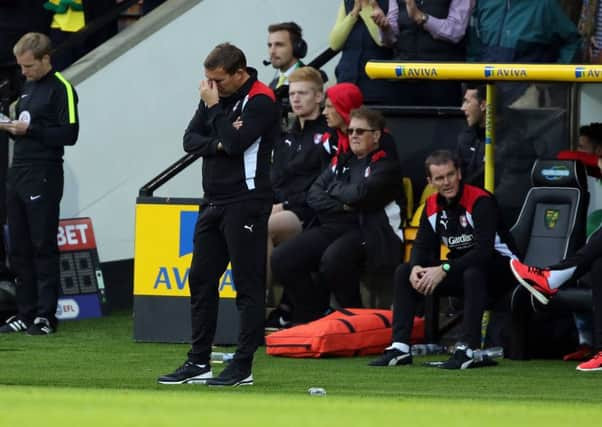

Today’s parting of the ways makes the Liverpudlian the shortest-serving manager in the Millers history. Not in number of days - that record goes to last season’s worker of the survival miracle, Neil Warnock, with 97 - but certainly in terms of games played.
The 44-year-old lasted just 14 fixtures and less than five months. 14 matches, 13 signings, one win, 23 goals conceded in seven consecutive away defeats, no points on the road, the end coming after six defeats on the trot, including two against teams who at the time were bottom of the table.
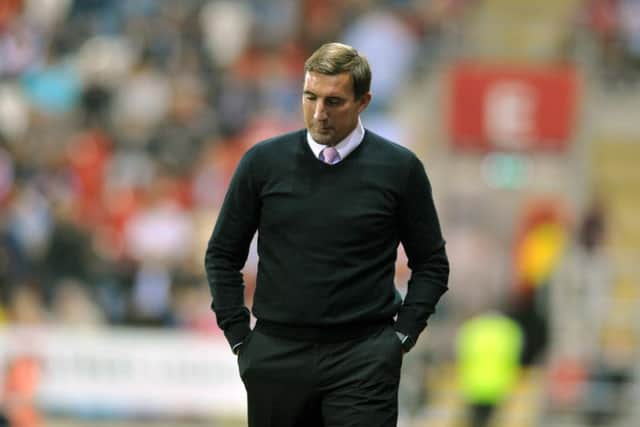

Advertisement
Hide AdAdvertisement
Hide AdThat record was bad enough. Add to it a mutiny among fans, Rotherham cut adrift at the foot of the Championship, the attitude of one or two players being doubted and no consistent signs of progress being made in defence and Stubbs’ time, which started on June 2, was run with a large chunk of October still left.
Supporters who had initially been cautiously supportive of his appointment wanted him to go.
They weren’t happy that no striker arrived in the transfer window, they hated the second-half derby collapse at Oakwell and losses against struggling Blackburn Rovers and Cardiff City, they didn’t enjoy seeing their side throw away home leads, give up midfield, defend too deep and ship so, so many goals away from home.
Results did for him in the end. But, as much as anything, fans didn’t care for the way their manager appeared to not care about them.
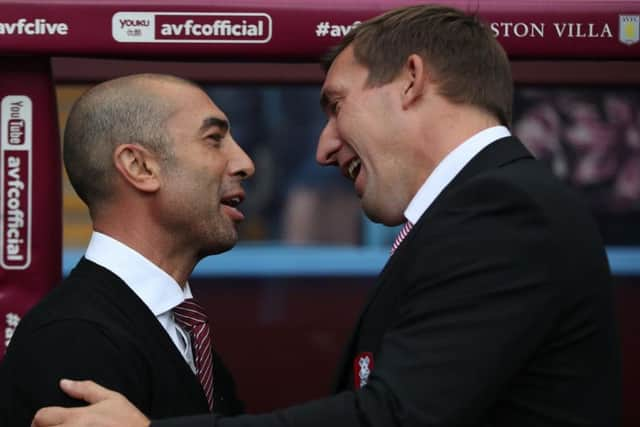

Advertisement
Hide AdAdvertisement
Hide AdStubbs never courted their approval. He hardly ever acknowledged them. Only twice, briefly, at the end of his only victory, the 1-0 success over Brentford at New York Stadium on August 20, and after the 1-0 home loss against Newcastle United did I see him applaud them from the touchline.
On August 16, 248 hardy Millers souls made the 452-mile round trip on a Tuesday night to Brighton to watch their side lose 3-0. Afterwards, their manager didn’t make a journey of half a pitch to thank them.
He was abused at Oakwell, booed for a 2-2 home draw with Bristol when Rotherham had led 2-0, blasted following away loss No 4 at previously winless Blackburn, berated when the Millers threw away a home lead against the Bluebirds.
“You have seen the shoulders on me. I can take that all day long,” he said after Barnsley and something very similar post City, famously adding for good measure: “Bring it on.”
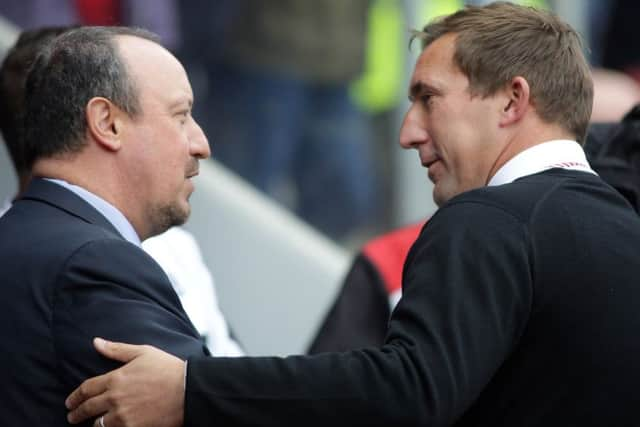

Advertisement
Hide AdAdvertisement
Hide AdIf a manager loses the fans, he can’t afford to lose games. Stubbs lost ten of his 14 and chairman Tony Stewart decided enough was enough after Tuesday’s 4-2 defeat at Birmingham City when the defensive horrors which have blighted the Millers all season were on show again.
No manager had made a worse start to his Rotherham career. Stubbs had been brought in with a long-term brief to restructure the club, but Stewart’s total commitment to remaining in the Championship made him act.
The loss followed defeat at Norwich City and a home reverse against Newcastle which came after successive losses against Huddersfield Town, Cardiff and Blackburn. Cardiff and and Blackburn had begun proceedings against the Millers propping up the table.
Stubbs kept blaming “individual errors” for the growing number of concessions and defeats. The malaise went deeper than that. As deep as Rotherham’s defending.
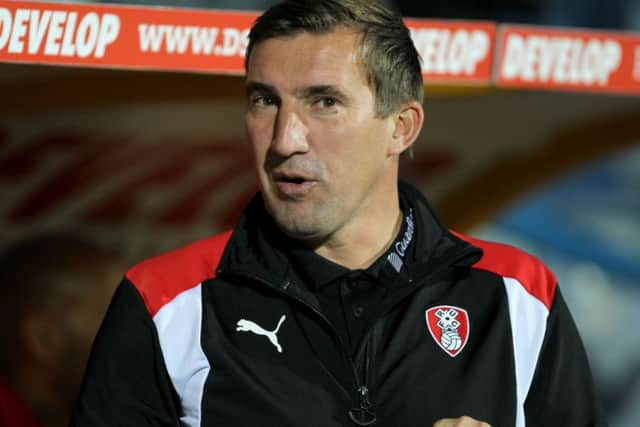

Advertisement
Hide AdAdvertisement
Hide AdThe system wasn’t right, or at least, as Stubbs said, wasn’t being operated properly by his players. Opponents were afforded too much time and space and that just brought pressure and problems.
Defeats of 3-0, 3-0, 4-0, 4-2, 2-1, 3-1 and 4-2 show how easy Rotherham were to break down away from home. Even at New York, where they were unbeaten in the league until a poor Cardiff side downed them, there were spells when they were cut to pieces by Wolverhapton Wanderers, Brentford and Bristol and could barely leave their own half.
Damningly, the Millers looked no tighter, no nearer a defensive solution, against Birmingham than they had on opening day against Wolves.
Stubbs seemed to believe in his system more than he believed in his players. He never changed the former and pointed the finger at the latter for “fundamental errors” even though he always claimed to trust them.
Never did he publicly blame himself.
Advertisement
Hide AdAdvertisement
Hide AdHe was attempting to introduce a new passing style with a bunch of new, young signings, some of whom have so far worked out better than others.


Chelsea loan youngster Izzy Brown is a major attacking talent and winger Jon Taylor has proved he can be a real threat at this level. Central defender Dael Fry is young, will have some tough days while he learns against experienced forwards but has huge potential. Right-back Darnell Fisher, despite some rough edges, is comfortable with the pace of the second tier.
Stubbs is entitled to feel disappointed by the contribution of centre-half Kelvin Wilson, winger Anthony Forde, midfielder Will Vaulks and let down by the impact, or lack of, of midfield pair Jake Forster-Caskey and Scott Allan.
The boss suffered bad luck with injuries. Midfield man Lee Frecklington and centre-half Kirk Broadfoot were both casualties in the first match of the season and their presence would have added some much-needed solidity, work ethic and spirit in those crucial first few weeks of a new season and new era.
Advertisement
Hide AdAdvertisement
Hide AdOn the subject of solidity, work ethic and spirit, allowing Richie Smallwood, a midfielder with defending in his DNA, to leave on loan for Scunthorpe United seemed a strange move at the time and still does now.
All the time, as the same failings appeared to go unaddressed, as Stubbs remained remote in the dugout or technical area as his team struggled, supporters’ growing frustration bubbled away and fermented in the background. He could have made his life much easier just by acknowledging them more.
Bring it on? He brought some of it on himself.
Defeats were one problem. His self-induced lack of rapport with fans a needless second one.
I find it hard to understand how a decent, intelligent man didn’t grasp the value of engaging with supporters more, didn’t appreciate how he could have been instrumental in uniting them and all the new faces he brought to the club.
Advertisement
Hide AdAdvertisement
Hide Ad“I am what I am,” he said. But being what he is contributed to his downfall. Just because your tendency isn’t to applaud fans shouldn’t mean you can’t see the benefits of doing it.
He was right when he said it wouldn’t be an issue if his side were winning games. But they weren’t.
I wonder if, after cutting his managerial teeth in the Scottish Championship with Hibernian, he under-estimated just how tough a division the English version is and gave himself too big a task by opting for wholesale changes to strategy and personnel on a budget dwarfed by those of the likes of Newcastle United and Aston Villa.
One of the first things Stewart told me, within minutes of the May 18 announcement that Warnock wouldn’t be staying, was that the club would look for a manager with experience of the Championship.
Advertisement
Hide AdAdvertisement
Hide AdStubbs, who interviewed well, brought a change of heart, although, in hindsight, the chairman might wish he had stuck with his initial inclination.
After matches, Stubbs didn’t appear to have a solution to the mounting number of defeats. ‘Individual errors’, ‘must do better’, ‘players could be dropped’ and ‘roll up sleeves’ were generic messages. Then came mixed ones ... ‘We win together and lose together’, ‘I’m all about the players’ ‘boo me, not them’, ‘it’s the players’ fault’.
He is an undemonstrative man, the polar opposite of Warnock and another Millers boss who went before him, Steve Evans. Rotherham supporters are used to seeing hearts on sleeves.
Last season, in his second year managing Hibernian, Stubbs won the Scottish FA Cup, the first time the Edinburgh club had lifted the trophy since 1902.
Advertisement
Hide AdAdvertisement
Hide AdYouTube footage shows him putting on a Hibs scarf when the celebrations at Hampden Park were at their height, but his face tells you nothing about what he’s just achieved. It’s as if he’s donning the green and white because there’s a sudden nip in the Glasgow air rather than because history has been made after a 114-year wait.
Yet he shares Warnock’s and Evans’ stubbornness and self-belief, refusing to change tack with Rotherham as results and opinion turned against him.
He has an air of authority about him befitting a tall man with the imposing physicality to match his height. But did he motivate his side enough? Did he inspire? Did he rattle egos when some players under-performed? He was a hard worker himself and put in the hours, but did he have them working as hard as they could? Did he make life truly uncomfortable for them when they deserved it?
When he took charge in 2014 at Hibs, his first managerial job, Stubbs gave a lifestyle interview by the beach at Portobello. As he sipped a cappuccino on the waterfront, he spoke of two men who had managed him in his playing days, Bruce Rioch at Bolton and Wim Jansen at Celtic.
Advertisement
Hide AdAdvertisement
Hide AdRioch could be “a right b*stard with a real nasty edge” capable of giving players “an old-school going-over”, he revealed. Jansen would sometimes cancel training when his players were tired.
Stubbs said he was leaning more towards the Jansen way.
He is a players’ man, and his mood visibly lightened when he was around his squad. Players I spoke to, even those out of the side, said training was organised and enjoyable. They found their boss a good bloke and warmed to his No 2, John Doolan, and straight-talking coach Andy ‘Taff’ Holden.
The departed manager was always obliging with the press, prepared to answer all questions - including the tough ones about his job - but he made no attempt to make his relationship with reporters a personal one. Rarely one for small talk, he was happy to sit in silence while journalists fiddled with notebooks and turned on dictaphones before the interviewing began.
I liked him, but could have liked him more had he just given a little bit of himself. He leaves after 140 days and I don’t really know him that much better than I did after day one.
Advertisement
Hide AdAdvertisement
Hide AdSome thought there was arrogance in him, that he’d been a top-flight player with Everton and had a Premier League opinion of himself. I think it was just reserve, his natural detachment from anyone not part of his inner football circle. I don’t truly know. Even though I was seeing him four times a week, he didn’t Iet me close enough to judge him to that degree.
Stubbs’ reluctance to form bonds has made him an easy figure for us all to possibly misunderstand. At heart, he is, I believe, a very solid, moral man.
He has gone because results and performances haven’t been good enough. And also because he alienated the club’s followers.
The former he tried to his best to sort out. The latter was a mistake he could have avoided.
‘Bring it on’ did nobody any good. Not the Millers, not fans, least of all him.